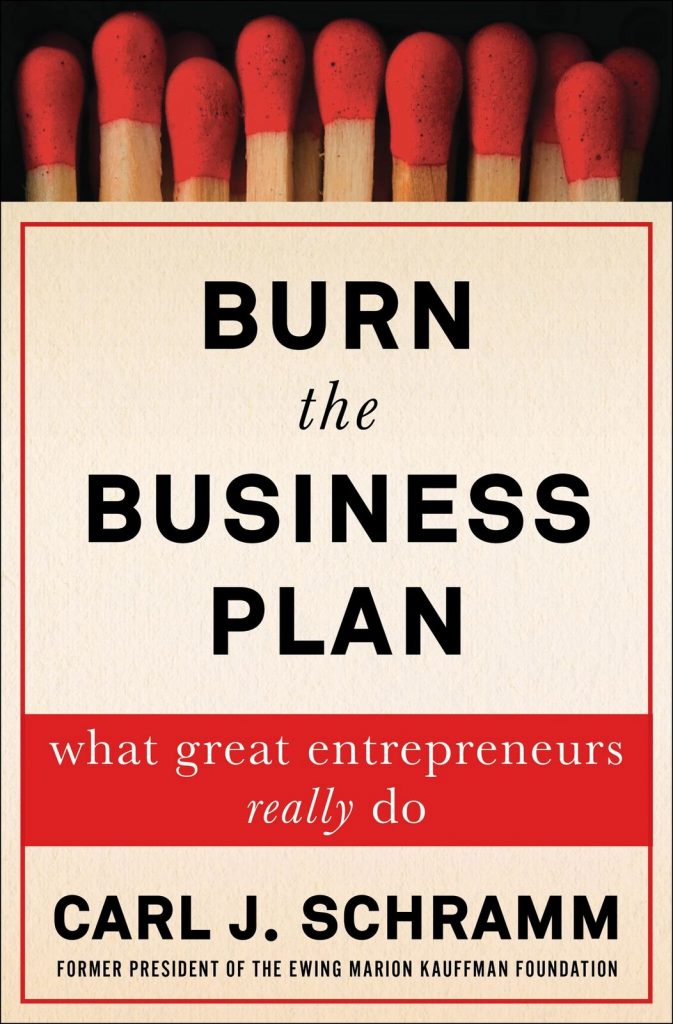When you started your business, one of the pieces of advise you undoubtedly received from friends, mentors, or your college professors was to have a well written business plan. Business plans have become essential for entrepreneurs who are looking to raise money to help fund their startups. But what if business plans are actually hurting entrepreneurs instead of helping them?
Carl Schramm certainly thinks they’re hurting more than helping. Schramm is the author of Burn the Business Plan: What Great Entrepreneurs Really Do (Simon & Schuster). He is a University Professor at Syracuse University and former president of the Ewing Marion Kauffman Foundation. Schramm has served in major corporate roles and chaired the US Department of Commerce’s Measuring Innovation in the Twenty-First Century Economy Advisory Committee. He was also a member of the President’s National Advisory Council on Innovation and Entrepreneurship.
Today we interview Schramm about why business plans don’t work, a few myths about entrepreneurship, and what it really takes to build a scalable business.
Welcome to StartUp Mindset, Carl. We’re excited to have you here. For the readers who are not familiar with you, could you tell us a little about yourself and your entrepreneurship background?
My career is like everyone else’s whether they know it or not. By this I mean, looking back it seems that every job expanded my view of the world, made me ready for unexpected new opportunities that I would never imagine were ahead of me. I think some people are hard wired to be in a circumstance and ready themselves for things ahead even though they can’t be described or even imagined.
I think I was getting ready to be an entrepreneur long before I saw my first opportunity. When I was 25 I was on the faculty at Johns Hopkins, never possibly thinking I’d be anything other than an academic economist the rest of my life. Then, I was ambushed by the idea that became my first company.
I was 38 and decided that maybe my destiny was to be a business person. Anyway I gave it a try. I think I’ve been able to see opportunity looming ahead a bit better with every year I’ve lived. I took the CEO job at the Kauffman Foundation really so I could direct research into how entrepreneurship connects to the larger economy. Five years ago I was surprised once again — when I left Kaufman six or seven universities asked me to consider returning to a professorship. I chose Syracuse because I wanted to concentrate on teaching undergraduates and to change the course of my own research from business to larger policy issues.
You’ve written a very good book called Burn the Business Plan. Tell us more about the book and why you decided to write it.
I wrote Burn the Business Plan because, being at Kauffman and having overseen ten years of great scholars doing empirical studies, not case studies, of how entrepreneurs really start their business I became convinced that what we teach intending to prepare would-be entrepreneurs is mostly wrong, that is, the vision driving course work and government policy, including public support of incubators and accelerators, is not resulting in more entrepreneurs.
In fact, as I show in my book, the more we teach more students and the more support we provide, fewer entrepreneurs actually start companies. In my book I call it the American “crisis” of entrepreneurship. Of course, the slow down in businesses being started is worse in Europe. While the numbers are difficult to assess, it does look as if entrepreneurship is rising in China.
Business professors, mentors, and coaches all say that when starting a business, you need a business plan. Why do you disagree?
The answer is simple: most companies start without business plans. Not only long established major corporations like GE, Proctor and Gamble, IBM, American Airlines, Wells Fargo Bank, Kelloggs and Campbell Soup, but most of the companies we think of as “new” born in the age when we used the term entrepreneur and were conscious of why new companies were so important. There was no business plan for Apple, Microsoft, Oracle, Intel, Uber or Facebook.
So, my question back to professors, mentors and coaches is why would you prescribe something that is clearly not needed to start a business? But, more importantly, why would someone slow down an enthusiastic entrepreneur for weeks or months going through the motions of planning. Those who insist on plans know or should know, I certainly do as an entrepreneur and as an investor, that the best plan will last about one second after the doors open on a new business. To do a twist on Von Molke’s theory about planning in war, a business plan will fail the minute the startup meets its first potential customer. If it doesn’t the business is likely to fail.
You write that, nowadays, as more business plans are being written, there’s an increasing number of startups that fail. That’s surprising. Why do you think this is the case?
There are several reasons. The most important is that our economy has been operating in slow motion. The “new normal” of 2 percent annualized GDP growth had a hugely dampening effect on entrepreneurs. Of course, in retrospect this rhetoric reflected Washington’s view that European style industrial policy, which favors giant companies and banks, was the best way to manage the economy.
But, by its nature, protecting big industries, seeing some of them as too big to fail (think GE), is inherently a dampening force on entrepreneurship. Startups exist to shake up and in some cases kill off sluggish giant companies that have become incompetent at innovation.
When government protects big companies its a sign to startups that the game is rigged. Regulation serves the same purpose — it always favors established companies. Put these two things together an its spell a hostile environment for entrepreneurs.
These days when people think of innovative entrepreneurship, they think of a college kid wearing a hoodie coding the next Facebook while eating pizza in his dorm room. We tend to think that entrepreneurship is a young person’s game. But in your book, you point out that is not the case. Can you tell us more about that?
Once again, I’ll let the facts tell the story. The average entrepreneur is 39 years old when he or she starts their company. There are several reasons. First, most entrepreneurs have a great idea overtake them, they don’t go searching for an idea to start a business around. Second, success climbs with age because older entrepreneurs have picked up a great deal of implicit knowledge about how business works.
The average entrepreneur has worked for someone else for more than ten years! Finally, middle aged entrepreneurs are more able to invest the needed first money into their startups. One reason that favors the cohort 30 to 40 years old is that, on average, student debt is settled when people turn 39. Why, in the face of these realities, we focus all our energy on encouraging college aged kids to start businesses in puzzling. Colleges should be attempting to support aspiring entrepreneurs who are well along in life.
In your book, you mention that many very successful companies such as Procter & Gamble, General Electric, Amazon and Facebook didn’t have business plans. Why do you think those businesses managed to succeed without a written plan?
The reason seems obvious — entrepreneurs learn by doing. The only way to become and entrepreneur is to try to start a successful business. This is entirely experiential knowledge. Procter and Gamble never thought at the outset about being anything other than two men building a soap and candle business. Importantly, because the word entrepreneur wasn’t in use, they never saw themselves doing anything special.
They were just building a business that would point day by day to its own destiny; that would unfold positively or negatively in response to the founders’ assessment of opportunity and their ability to manage it. Importantly, they were never seeing their new company as something that was transitory. They built for lasting value. The idea of an “exit plan” was about as easy for them to comprehend as imaging a man on the moor or an Internet where they could sell soap in nanoseconds to a householder in Guam.
The SBA reports that two-thirds of all businesses will fail within 2 years. Why do you think this is and how can entrepreneurs avoid becoming a statistic?
The reason is that as always, the deck is stacked against entrepreneurs. Now, as I said, government has favored big companies even as it talks a great game about the importance of entrepreneurs. It remains to be seen if the Trump Administration will be more friendly to entrepreneurs. There is no evidence that the SBA is doing much of anything different. The agency is committed to the same old tired formula of requiring formal business plans for loans and urging would-be entrepreneur to take formal training.
It has business counselors who have worked in federal service all their lives and know next to nothing of what its like to really take the risk of starting a business. All this suggests that no matter what, starting a business is inherently risky. The safest way to own a successful startup is really by buying a franchise developed by a successful company. Of course, business schools and professors or entrepreneurship don’t regard franchises owners as “real” entrepreneurs. Ask any franchise owner what his life if like and he will describe what being an entrepreneur is all about.
What growth advice would you give to a startup founder who wants to elevate their business past the survival stage?
This about the “survival stage” as the problem you have to solve today to make your business bigger and more profitable tomorrow. Keep you eye on scale. And, if when you have applied all your best thinking to a business and it is not responding, don’t waste more time. Some dogs can’t hunt.
What one mindset or trait do you feel every entrepreneur must possess in order to become successful?
I think the key is almost a definition of anti-planning. What I mean is that every successful entrepreneur I know is somehow able to keep a plastic mind about what he or she is seeing in the environment in which they are competing. All of us carry visions of how the relevant market our companies work in will behave in the long-term future. It is hard to subject our vision to continuous adjustment.
This is not easy because it requires us to doubt what we think we know and the actions we have taken. The whole notion of “pivoting” requires the ability to abandon one vision of how the future is likely to happen for another, all the while making critical decisions on very little evidence. Entrepreneurs who hold fast to a plan, somewhat like a security blanket — “I believed this is the path to success back then, my investors believe it too, therefore I must keep trying this,” — are as like as not to fail.
The world is chaotic, customers are fickle, employees are not perfect, technology is unpredictable, and Black Swans keep showing up, commonly as recessions. Great entrepreneurs sometimes seem to be the antithesis of great managers because they know that until their company is up and running, the path toward success is requires constantly adjusting any and every aspect of the environment they control.
For more information, please visit http://carlschramm.com and follow Carl on Twitter @CarlSchramm










